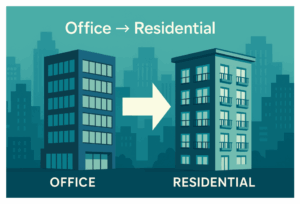In the United States, buying a real estate bank note means purchasing the loan, or debt instrument, that is secured by a piece of real estate property. A bank note (also known as a mortgage note or promissory note) represents the debt agreement between a lender (typically a bank or financial institution) and a borrower. The borrower agrees to repay the loan according to specific terms, including interest rates, repayment schedules, and penalties for non-payment.
When you buy a real estate bank note, you effectively step into the shoes of the lender. You own the right to receive the payments from the borrower, including principal and interest, as agreed in the original terms of the note. However, it’s essential to understand the complexities involved in this transaction and what it entails.
Key Points About Buying a Real Estate Bank Note in the U.S.
Types of Real Estate Notes
There are generally two types of real estate notes you can purchase:
- Performing Notes: In this case, the borrower is making regular payments as per the loan agreement. As the note holder, you will continue to receive these payments.
- Non-Performing Notes: These notes involve borrowers who have defaulted on their payments. When you buy a non-performing note, you have the opportunity to either work with the borrower to restructure the loan or pursue foreclosure to recover the debt through the sale of the property.
Why People Buy Real Estate Notes
Investors buy real estate notes for several reasons:
- Income Generation: Performing notes generate a steady income stream through the interest payments made by the borrower.
- Discounted Purchase Price: Non-performing notes are often sold at a significant discount, allowing investors to potentially profit by either getting the loan back on track or foreclosing on the property.
- Diverse Investment Portfolio: Real estate notes are a form of alternative investment that can diversify a portfolio and offer opportunities beyond traditional stocks and bonds.
- Collateral: Since the note is secured by real estate, if the borrower defaults, the investor has the option to take ownership of the property through foreclosure.
Risks of Buying Real Estate Notes
While investing in real estate notes can be profitable, it also carries risks:
- Default Risk: Especially with non-performing notes, there’s a chance that the borrower will never resume payments, leading to legal proceedings and foreclosure.
- Property Condition: The underlying property may have issues, such as structural problems or other liabilities, which can affect its value if you need to take possession.
- Foreclosure Costs: If the borrower defaults, you may have to initiate foreclosure, which can be time-consuming and costly.
- Market Conditions: Changes in the real estate market can affect the value of the property securing the note, impacting your investment returns.
How to Buy Real Estate Notes
The process of buying a real estate bank note typically involves the following steps:
- Research and Due Diligence: Investigate the note, the borrower, and the property that secures the note. You’ll need to assess the borrower’s payment history, the terms of the loan, and the property’s condition and market value.
- Purchase Agreement: If you decide to move forward, you’ll enter into a purchase agreement with the current note holder (often a bank, mortgage company, or another investor).
- Transfer of Ownership: Once the sale is finalized, the ownership of the note is transferred to you, and you will begin receiving the borrower’s payments.
- Servicing the Loan: Some investors handle the loan servicing (i.e., managing payments, keeping track of balances) themselves, while others hire a third-party loan servicing company to manage these tasks.
Benefits of Buying Real Estate Notes
- Passive Income: For performing notes, the borrower’s regular payments can provide a consistent source of passive income.
- Higher Yields: Notes can offer higher returns than traditional real estate investments or low-interest savings accounts, especially if you purchase non-performing notes at a discount.
- Secured Investment: The property acts as collateral, offering some protection if the borrower defaults.
Where to Buy Real Estate Notes
There are several places where you can buy real estate notes, including:
- Banks and Financial Institutions: Banks sometimes sell non-performing loans to investors at discounted prices.
- Loan Brokers: These professionals specialize in matching note sellers with buyers.
- Real Estate Investment Groups: Some investment clubs or groups provide access to real estate notes for their members.
- Online Marketplaces: Websites and platforms exist where investors can buy and sell real estate notes.
Conclusion
Buying a real estate bank note in the U.S. can be a profitable venture, especially for investors seeking a mix of passive income and potential property ownership. However, it is essential to fully understand the risks involved, conduct thorough research, and seek professional advice when necessary.




